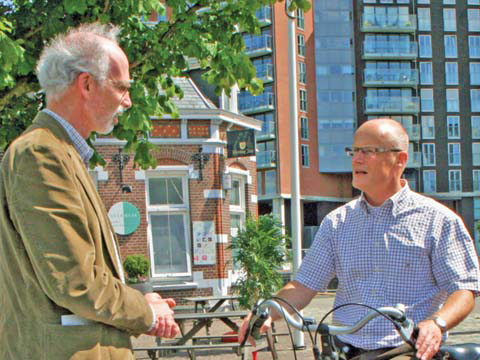A Relevant Message

More than 500 years after John Calvin's birth, the Dutch have a love-hate relationship with the famous reformer. Netherlanders appreciate and honor Calvin for profoundly shaping their history and culture. Yet the Netherlands is today one of the most secular countries in Europe. Nearly half of the population self-identifies as non-religious. Dutch society embraces a tolerance at the opposite extreme from the religious intolerance of Calvin's day
In the midst of this secular European setting, the Church of the Nazarene is making a difference. Dutch members of the Church of the Nazarene are connecting the ancient message of the gospel with the concerns of the postmodern world in which they live.
In the Netherlands, society is largely comprised of progressive-thinking people. This forward thinking influences the way Dutch Nazarenes understand the Christian gospel
Dutch Nazarenes care not only about overcoming individual sin, but they also care about the environment, the poor, and how they might effectively engage secular humanists.
"The Church in the Netherlands," says Pastor Erik Groeneveld, is "finding ways to reach non-Christians in a postmodern society." This greatly shapes the way that ministry is being done and how the Holy Spirit is active in the country. "We are at the cutting edge of postmodernity," says Pastor Annemarie Snijders.
Dutch society is also religiously diverse. "We are continually faced with the question: what difference do we make in the life of unbelievers, in the face of those of other faiths," says Netherlands District Superintendent Arthur Snijders. This means, in part, caring about the context in which the gospel is preached. "It can be difficult," says Pastor Paul van der Laan, "to communicate the message of the gospel in relevant and contemporary ways without losing or manipulating the message itself."
Leading layperson, Hans Deventer, believes the denomination's "accent on holiness is good and the promise of sanctification important." He sees the message of genuine transformation as crucial. Deventer says that the Church of the Nazarene's doctrine of prevenient grace provides a key to help Dutch Nazarenes see God at work in their culture. God is present and active in a society filled with people who are yet to be made aware of God.
This issue of holiness being worked out in people is critical for the Dutch context.
"There is a longing to become more missional both on a local level and on a district level, and that is exciting," says Annemarie Snijders. "At the same time we wrestle with how to reach non-Christians, and how holiness is being worked out in people whose lives show a lot of fragmentation."
"Over the past 10 years," says Arthur Snijders, "we have seen resurgence in spiritual growth." This growth has come in part as Dutch Nazarenes realize that their message and distinctives are broader than just entire sanctification. "In contrast to Catholic and Reformed Churches," Snijders says, "the Church of the Nazarene offers a message of 'holiness without the legalism,' but also the open-mindedness that comes with prevenient grace."
Dutch Nazarenes make the holiness message relevant in their postmodern context by caring for the holistic needs of their neighbors. "Currently," says Pastor Stephen Overduin, "there is a general movement from being inward focused churches to being outward focused churches. I believe that we as a church are realizing that we have a place in the cities where we can contribute to society, and can be a blessing to many people in need."
Overduin's own church building functions as a distribution point for free groceries and secondhand clothing for the needy. "Once a month we serve a warm meal to the visitors at the food distribution," says Overduin. "This is a great moment for fellowship between our church members and the needy of the neighborhood. It also makes the threshold lower for people of the neighborhood to visit our church, and to come to us with their spiritual questions."
"My dream," says Overduin "is that in 10 years we may have several mission posts throughout the city, where people come together, their basic physical, social, and psychological needs are met, and most important of all, they meet God."
One example of how the Dutch context shapes ministry in the Netherlands is transportation. In a country deeply affected by and concerned with global warming, Dutch Nazarenes make it a priority to connect environmental concerns with the message of God's covenant with all creation. Nazarenes are more likely to bike to church or take a train than drive individual vehicles. They are more likely to participate with earnestness in efforts to "go green."
Lives are changed in simple ways as Dutch Nazarenes share God's love.
According to Pastor Paul van der Laan, "People are astonished nowadays by things like people shaking hands, wishing you welcome at the beginning of the service—people just giving hugs. In a society built around individualism, these simple signs of being a loving and caring community cause people to ask questions, which you may answer with the love of God."
Various statistics indicate that Dutch members of the Church of the Nazarene are succeeding in their efforts. With only 97 members in 1979, the Church of the Nazarene in the Netherlands has seen strong growth over the past 30 years. By 2008, membership was up to nearly 2,000. Since 1998, there have been over 1,250 recorded professions of faith. These numbers represent lives that have been changed by the grace of God.
Dutch Nazarenes are sharing an encouraging and powerful message of transformation. This message is needed in the Netherlands as much as anywhere in the world!
Thomas Jay Oord is professor of theology and philosophy at Northwest Nazarene University in Nampa, Idaho.
W. Andrew Schwartz is a Ph.D. student at the Claremont Graduate University in Claremont, California.
Holiness Today, July/August 2010
Please note: This article was originally published in 2010. All facts, figures, and titles were accurate to the best of our knowledge at that time but may have since changed.




